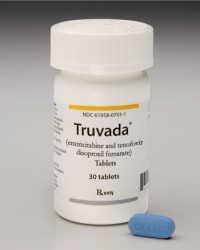 People diagnosed with HIV—the human immunodeficiency virus that without treatment develops into AIDS—take antiviral medications to control the infection that attacks their immune system.
People diagnosed with HIV—the human immunodeficiency virus that without treatment develops into AIDS—take antiviral medications to control the infection that attacks their immune system.
Now, for the first time, adults who do not have HIV but are at risk of becoming infected can take a medication to reduce the risk of sexual transmission of the virus.
The Food and Drug Administration (FDA) has approved the new use of Truvada—to be taken once daily and used in combination with safer sex practices—to reduce the risk of sexually acquired HIV-1 infection in adults who do not have HIV but are at high risk of becoming infected. (HIV-1 is the most common form of HIV.)
In two large clinical trials, daily use of Truvada was shown to significantly reduce the risk of HIV infection
- by 42 percent in a study sponsored by the National Institutes of Health (NIH) of about 2,500 HIV-negative gay and bisexual men and transgender women, and
- by 75 percent in a study sponsored by the University of Washington of about 4,800 heterosexual couples in which one partner was HIV positive and the other was not.
Debra Birnkrant, M.D., director of the Division of Antiviral Products at FDA, explains that Truvada works to prevent HIV from establishing itself and multiplying in the body. She notes that while this is a new approved use, Truvada is not a new product. It was approved by FDA in 2004 for use in combination with other medications to treat HIV-infected adults and children over 12 years old.
“In the 80s and early 90s, HIV was viewed as a life-threatening disease; in some parts of the world it still is. Medical advances, along with the availability of close to 30 approved individual HIV drugs, have enabled us to treat it as a chronic disease most of the time,” Birnkrant says.
“But it is still better to prevent HIV than to treat a life-long infection of HIV,” she says.
Birnkrant stresses that Truvada is meant to be used as part of a comprehensive HIV prevention plan that includes consistent and correct condom use, risk reduction counseling, regular HIV testing, and treatment of any other sexually-transmitted infections. Truvada is not a substitute for safer sex practices, she says.
CLICK HERE to read an article about the approval from CBS.com
